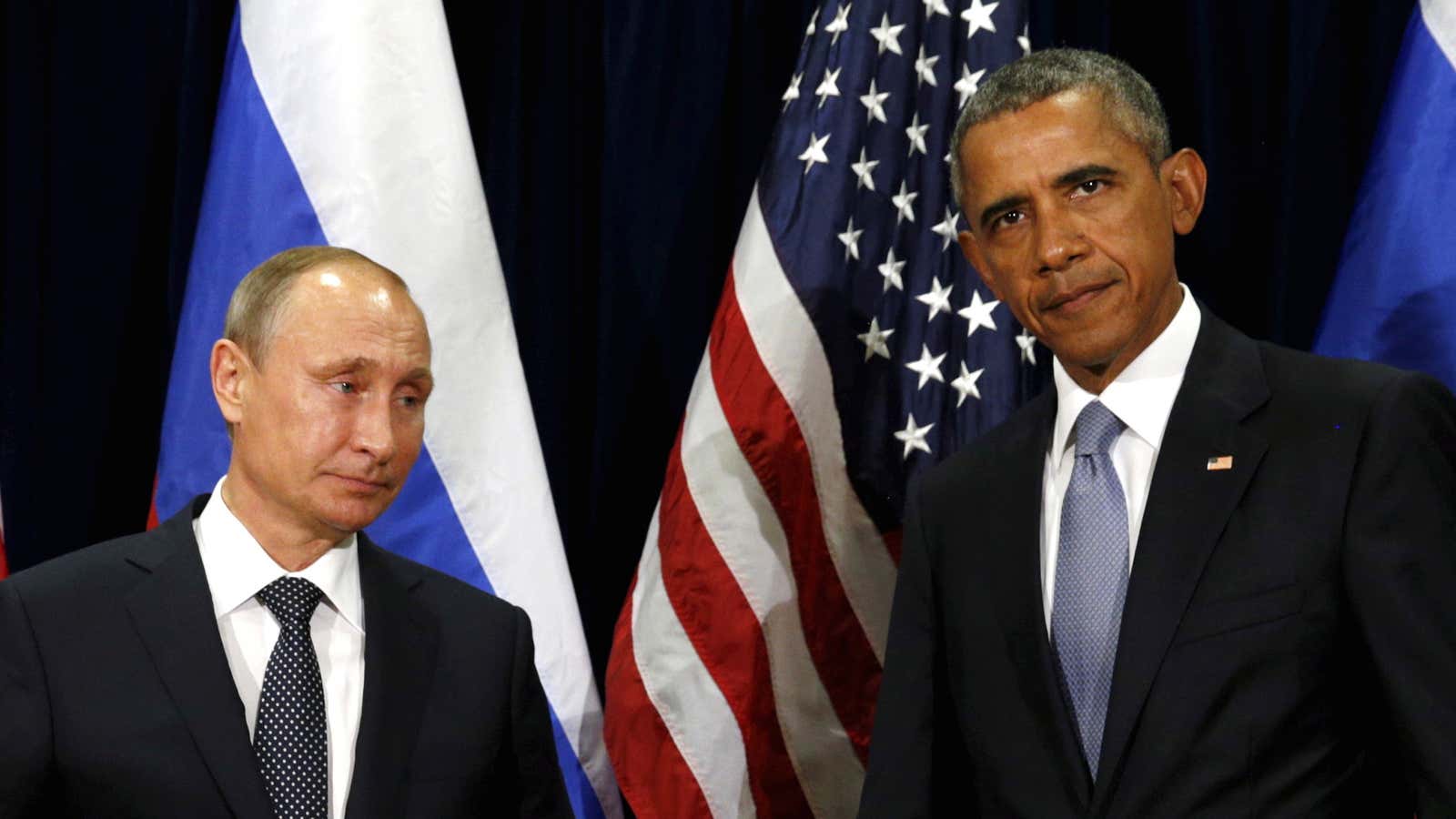In the wake of WikiLeaks’ release of some 20,000 Democratic National Committee emails, US president Barack Obama faces three questions of some urgency. Did Russia hack and hand over the emails? If so, is the country trying to sway the US presidential election? And, if the answer is yes to both, how should Obama respond?
So far, the president has reacted cautiously. He noted experts believe that Russian president Vladimir Putin could be behind the hack, but has also played down the episode. Even if an FBI investigation under way convincingly implicates Moscow, Obama has said it would not wildly change his already-sour appraisal of the “tough, difficult relationship that we have with Russia right now.” (Russia has vehemently denied anything to do with the hack.)
Indeed, Putin has been on something of a tear in recent years, reportedly funding extremist European political parties that challenge the status quo, overseeing an Olympics program that has been accused of a massive doping scandal, and of course invading and annexing territory belonging to his neighbors. But if Russia is indeed behind the hack of the DNC and the emails’ calculated release just before the Democratic National Convention, it is an unprecedented intervention in US politics.
Forewarned, US entities will redouble their cyber defenses, and American intelligence agencies will continue their own, routine espionage operations on Russian soil. Yet, while no one ought to be surprised by Putin’s latest exploits, they are in fact worrying. Putin has been suspected of carrying out similarly intrusive “active measures” or “hybrid warfare,” as such mischief is called in intelligence parlance, in Europe for years. But this latest event may represent a different national security threat than previous Kremlin meddling.
According to CrowdStrike, the private cyber-security firm that investigated the hack, experts have evidence that Putin interfered directly with US affairs at a very fundamental, even personal, level. If he can influence, or even simply make voters doubt the integrity of national elections, he can fundamentally endanger stateside domestic stability. And, if Russian hackers were behind the leaks, it’s now clear that the country’s attackers are both brazen and extremely capable. A line has been crossed, and Obama must now figure out how to respond.
Moscow has been accused of being behind other Washington hacks. Before the DNC hack, again according to security from CrowdStrike, some of the same Russian hackers that attacked the DNC gained access to Obama’s unclassified email and broke into the State Department and the Joint Chiefs of Staff.
If the FBI investigation identifies Russian culprits in the DNC break-in, Obama should consider sanctioning them, as is permitted under an executive order he signed last year. The sanctions might extend specifically to senior actors in Russia’s military intelligence service (the GRU), and the Federal Security Service (the FSB), which cyber experts believe worked to gain access US servers. Obama should also make cyber-intrusions a prominent issue in the annual gathering of world leaders at the UN General Assembly held in New York in September. And he should encourage an alliance of like-minded nations to raise their own deterrence capabilities as well.
The US should not be in the habit of publicly exacting revenge for cyber attacks, a response that can backfire and play into the hands of the intruders. But according to William Courtney, a former US ambassador and a Russia expert at Rand, there are exceptions. When a well-defended and sensitive US target falls victim to “a highly skilled foreign cyber villain,” the US can feel justified conducting retaliatory cyber disruption. This description seems fitting for any future Russian cyber-led attack in the US, including an October attack timed to maximize chaos on the eve of the November election. The US can and should step in with counter-measures under such circumstances.
Of course, in Putin’s conspiratorial mind, he is merely responding in kind—in his imagination, the US started the trouble when it facilitated the 2014 overthrow of the pro-Moscow former Ukrainian president Viktor Yanukovych. Far worse, Putin believes Hillary Clinton herself, as secretary of state, fomented and paid for 2011 street protests in which thousands of demonstrators in Moscow chanted “Putin is a thief.” “She set the tone for some actors in our country and gave them a signal,” Putin said at the time. “They heard the signal and with the support of the U.S. State Department began active work.”
Putin may be tragically misguided in this respect. But that does not mean that the US must sympathetically countenance his behavior.
If Russia is indeed behind the hacks, it suggests Putin is not worried about getting caught burglarizing the American political edifice like a small-time hood—or for that matter allegedly cooperating with the likes of WikiLeaks founder Julian Assange. Such actions could in turn jeopardize what is left of Putin’s relationship with the West. Even as he has cozied up to deranged killers like Syria’s Bashar al-Assad and Chechnya’s Ramzan Kadyrov, he pretended to be a serious diplomatic player. But no one is willing to negotiate with a thief who breaks into their house in the middle of the night.
